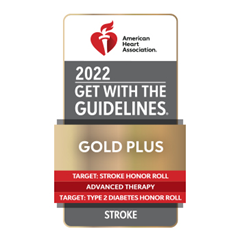Miami Valley Hospital, Upper Valley Medical Center Receive Get With The Guidelines Awards
Miami Valley Hospital and Upper Valley Medical Center have received the American Heart Association and American Stroke Association’s Get With The Guidelines®-Stroke Gold Plus Quality Achievement Award. The award recognizes the hospitals’ commitment to ensuring stroke patients receive the most appropriate treatment according to nationally recognized, research-based guidelines based on the latest scientific evidence from the American Heart Association (AHA).
Both hospitals earned the award by meeting specific quality achievement measures for the diagnosis and treatment of stroke patients at a set level for a designated period. These measures include evaluation of the proper use of medications and other stroke treatments aligned with evidence-based guidelines – all with the goal of speeding recovery and reducing death and disability for stroke patients. Before discharge, patients should also receive education on managing their health, schedule a follow-up visit, as well as other care transition interventions.
 Additionally, Miami Valley Hospital received the Target: Stroke Honor Roll Advanced Therapy Award. The Level I Trauma Center and
Comprehensive Stroke Center received this recognition for meeting quality measures developed to reduce the time between the patient’s arrival at the hospital and treatment with the clot-buster tissue plasminogen activator, or tPA, the only drug
approved by the U.S. Food and Drug Administration to treat ischemic stroke. Miami Valley Hospital received this designation by having Door-To-Device (DTD) times in at least 50 percent of applicable patients within 90 minutes for direct arrivals and
within 60 minutes for transfer.
Additionally, Miami Valley Hospital received the Target: Stroke Honor Roll Advanced Therapy Award. The Level I Trauma Center and
Comprehensive Stroke Center received this recognition for meeting quality measures developed to reduce the time between the patient’s arrival at the hospital and treatment with the clot-buster tissue plasminogen activator, or tPA, the only drug
approved by the U.S. Food and Drug Administration to treat ischemic stroke. Miami Valley Hospital received this designation by having Door-To-Device (DTD) times in at least 50 percent of applicable patients within 90 minutes for direct arrivals and
within 60 minutes for transfer.
According to the American Heart Association and American Stroke Association, stroke is the fifth leading cause of death and a leading cause of adult disability in the United States. On average, someone in the United States suffers a stroke every 40 seconds, and nearly 795,000 people suffer a new or recurrent stroke each year.
Back to the October 2020 issue of Premier Pulse

